William G. Milliken, Michigan's longest-serving governor who established a record of environmental conservation and bipartisan cooperation that made him popular among Republicans and Democrats, died Friday at age 97, a family spokesman said.
Milliken died at his home in Traverse City after years of declining health, Jack Lessenberry said.
The Republican was promoted to governor from lieutenant governor in 1969 when Gov. George Romney resigned to join President Richard Nixon's administration. Milliken subsequently won three elections but didn't run again in 1982, retiring from politics after 14 years as Michigan's chief executive.
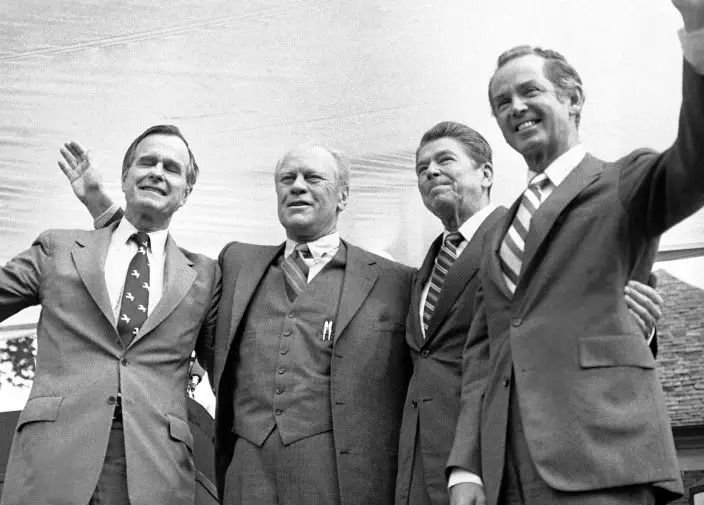
FILE - In this Thursday, Oct. 16, 1980 file photo, Republican nominee for Vice President George Bush, left, and Gerald Ford wave to crowds at a rally in Bloomfield, Mich. as they are joined by Republican presidential-hopeful Ronald Reagan and Michigan Gov. William G. Milliken, Michigan’s longest-serving governor who established a record of environmental conservation and bipartisan cooperation that made him popular among Republicans and Democrats, died Friday, Oct. 18, 2019 at age 97, a family spokesman said.(AP PhotoWalt Zeboski, File)
Milliken was a moderate Republican who occasionally crossed swords with members of his own party but was popular with big-city Democrats, especially Coleman Young, Detroit's first black mayor.
Gov. Gretchen Whitmer, a Democrat, called him a "true statesman."
"He had a unique ability to bring people from both sides of the aisle together for the betterment of Michigan," she said. "We are a stronger, safer, more sustainable state because of his leadership and dedication to the people who call it home."
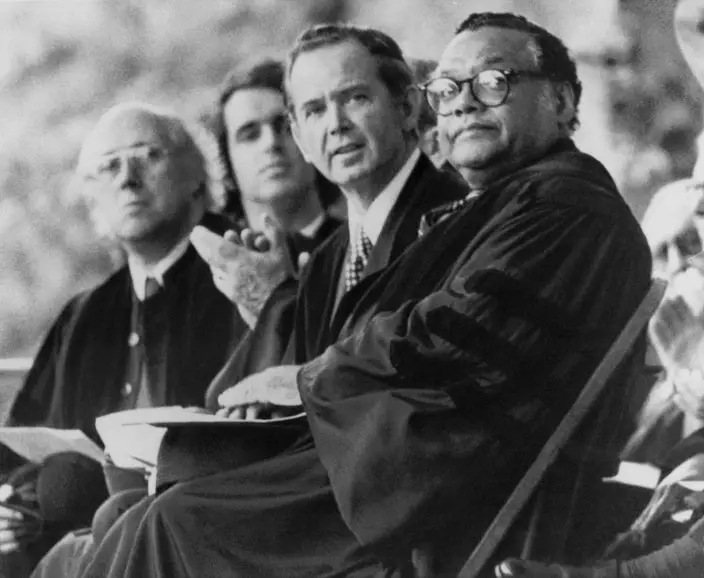
FILE - In this Monday, May 17, 1976 file photo, U.S. Dept. of Transportation Secretary William T. Coleman Jr., right, and Michigan Gov. William G. Milliken, second from right, sit on the platform during Commencement ceremonies at Yale University in New Haven, Conn. William G. Milliken, Michigan’s longest-serving governor who established a record of environmental conservation and bipartisan cooperation that made him popular among Republicans and Democrats, died Friday, Oct. 18, 2019 at age 97, a family spokesman said. (AP PhotoBob Child, File)
One of his first acts was sending the Legislature a 20-point environmental agenda, ushering in a period that produced far-reaching ecological safeguards. Among them: the Michigan Environmental Protection Act, enabling citizens to sue polluters; protections for rivers, Great Lakes coastlines, wetlands and inland lakes; a deposit on soda and beer bottles; and limits on phosphorus in laundry detergent to help Lake Erie.
Milliken "believed government should be about seeking solutions that bring people together, instead of political issues that divide," said William Rustem, who was his environmental adviser.
Prodded by his wife, Milliken helped broker a compromise that limited oil and gas drilling in the Pigeon River State Forest. He signed a 1972 law to create the Michigan Lottery, which remains a key source of cash for schools.
Milliken said in a 2006 interview that defending the environment was a "never-ending struggle."
"The tragedy is that once we lose the beauty and the environmental values around us, we've lost it forever," he said. "We must come to understand these values and fight for them."
Perhaps Milliken's most surprising alliance was with Young, whose left-wing politics and combative style antagonized white conservatives. Milliken won over Young by supporting state aid to Detroit as the city struggled with racial strife, population loss and the auto industry's tailspin during the energy crisis of the 1970s.
Milliken faced a disaster in 1973 when a chemical company accidentally shipped fire retardant containing highly toxic polybrominated biphenyl, or PBB, instead of cattle feed to thousands of farmers. It took more than a year for state agriculture officials to determine the feed was tainted and several more months before action was taken that led to the slaughter of more than 1 million animals.
Fear spread over the health effects of eating contaminated animals, their milk or eggs. When Milliken went to the tiny community of Mio to talk to residents about burying slaughtered animals, he spoke "with his effigy (hanging) behind him and a near riot in front of him," biographer David Dempsey said.
In the early 1970s, Milliken gave asylum to a young black man convicted of killing his abusive father in Arkansas. Lester Stiggers traveled to Michigan during a furlough from prison but refused to return. Milliken rejected requests to extradite him, citing, in part, the "cruel and unusual treatment" of blacks in Arkansas prisons.
Milliken's moderate style of Republican politics fell out of fashion in the decades after he left office. He endorsed Democrats Barack Obama and John Kerry for president and some other Democrats seeking statewide office in Michigan.
"He's not relevant any longer," Michigan Republican Party Chairman Bobby Schostak said in 2014, shrugging off the endorsements.
But many Republicans still sought Milliken's blessing, hoping an endorsement would appeal to independent and moderate voters. They included Rick Snyder, who was governor from 2011 to 2019.
Milliken graduated from Yale University in 1946 after serving in the U.S. Army Air Corps. He earned a Purple Heart and other medals during World War II after several harrowing missions that included bailing out of a damaged B-24 bomber.
He took a turn running Milliken's Department Store in Traverse City, founded in 1873 by his grandfather, James W. Milliken.
Milliken is survived by a son also named William.
Lessenberry said Milliken's remains will be cremated and interred next to those of his wife, Helen, and daughter, Elaine, in the Mackinac Island Cemetery. A memorial service will be held next May.
UNITED NATIONS (AP) — The United States vetoed a widely backed U.N. resolution Thursday that would have paved the way for full United Nations membership for Palestine, a goal the Palestinians have long sought and Israel has worked to prevent.
The vote in the 15-member Security Council was 12 in favor, the United States opposed and two abstentions, from the United Kingdom and Switzerland. U.S. allies France, Japan and South Korea supported the resolution.
The strong support the Palestinians received reflects not only the growing number of countries recognizing their statehood but almost certainly the global support for Palestinians facing a humanitarian crisis caused by the war in Gaza, now in its seventh month.
The resolution would have recommended that the 193-member U.N. General Assembly, where there are no vetoes, approve Palestine becoming the 194th member of the United Nations. Some 140 countries have already recognized Palestine, so its admission would have been approved, likely by a much higher number of countries.
U.S. deputy ambassador Robert Wood told the Security Council that the veto “does not reflect opposition to Palestinian statehood but instead is an acknowledgment that it will only come from direct negotiations between the parties."
The United States has “been very clear consistently that premature actions in New York — even with the best intentions — will not achieve statehood for the Palestinian people,” deputy State Department spokesman Vedant Patel said.
His voice breaking at times, Palestinian U.N. Ambassador Riyad Mansour told the council after the vote: “The fact that this resolution did not pass will not break our will and it will not defeat our determination.”
“We will not stop in our effort,” he said. “The state of Palestine is inevitable. It is real. Perhaps they see it as far away, but we see it as near.”
This is the second Palestinian attempt for full membership and comes as the war in Gaza has put the more than 75-year-old Israeli-Palestinian conflict at center stage.
Palestinian President Mahmoud Abbas first delivered the Palestinian Authority’s application for U.N. membership in 2011. It failed because the Palestinians didn’t get the required minimum support of nine of the Security Council’s 15 members.
They went to the General Assembly and succeeded by more than a two-thirds majority in having their status raised from a U.N. observer to a non-member observer state in 2012. That opened the door for the Palestinian territories to join U.N. and other international organizations, including the International Criminal Court.
Algerian U.N. Ambassador Amar Bendjama, the Arab representative on the council who introduced the resolution, called Palestine’s admission “a critical step toward rectifying a longstanding injustice" and said that “peace will come from Palestine’s inclusion, not from its exclusion.”
In explaining the U.S. veto, Wood said there are “unresolved questions” on whether Palestine meets the criteria to be considered a state. He pointed to Hamas still exerting power and influence in the Gaza Strip, which is a key part of the state envisioned by the Palestinians.
Wood stressed that the U.S. commitment to a two-state solution, where Israel and Palestine live side-by-side in peace, is the only path for security for both sides and for Israel to establish relations with all its Arab neighbors, including Saudi Arabia.
“The United States is committed to intensifying its engagement with the Palestinians and the rest of the region, not only to address the current crisis in Gaza, but to advance a political settlement that will create a path to Palestinian statehood and membership in the United Nations,” he said.
Mansour, the Palestinian U.N. ambassador, reiterated the commitment to a two-state solution but asserted that Israel believes Palestine "is a permanent strategic threat."
"Israel will do its best to block the sovereignty of a Palestinian state and to make sure that the Palestinian people are exiled away from their homeland or remain under its occupation forever,” he said.
He demanded of the council and diplomats crowded in the chamber: “What will the international community do? What will you do?”
Israeli-Palestinian negotiations have been stalled for years, and Israel’s right-wing government is dominated by hard-liners who oppose Palestinian statehood.
Israeli U.N. Ambassador Gilad Erdan called the resolution “disconnected to the reality on the ground” and warned that it “will cause only destruction for years to come and harm any chance for future dialogue.”
Six months after the Oct. 7 attack by the Hamas militant group, which controlled Gaza, and the killing of 1,200 people in “the most brutal massacre of Jews since the Holocaust,” he accused the Security Council of seeking “to reward the perpetrators of these atrocities with statehood.”
Israel’s military offensive in response has killed over 32,000 Palestinians, according to Gaza’s health ministry, and destroyed much of the territory, which speaker after speaker denounced Thursday.
After the vote, Erdan thanked the United States and particularly President Joe Biden “for standing up for truth and morality in the face of hypocrisy and politics.”
He called the Palestinian Authority — which controls the West Bank and the U.S. wants to see take over Gaza where Hamas still has sway — “a terror supporting entity.”
The Israeli U.N. ambassador referred to the requirements for U.N. membership – accepting the obligations in the U.N. Charter and being a “peace-loving” state.
“How can you say seriously that the Palestinians are peace loving? How?” Erdan asked. “The Palestinians are paying terrorists, paying them to slaughter us. None of their leaders condemns terrorism, nor the Oct. 7 massacre. They call Hamas their brothers.”
Despite the Palestinian failure to meet the criteria for U.N. membership, Erdan said most council members supported it.
“It’s very sad because your vote will only embolden Palestinian rejectionism every more and make peace almost impossible,” he said.
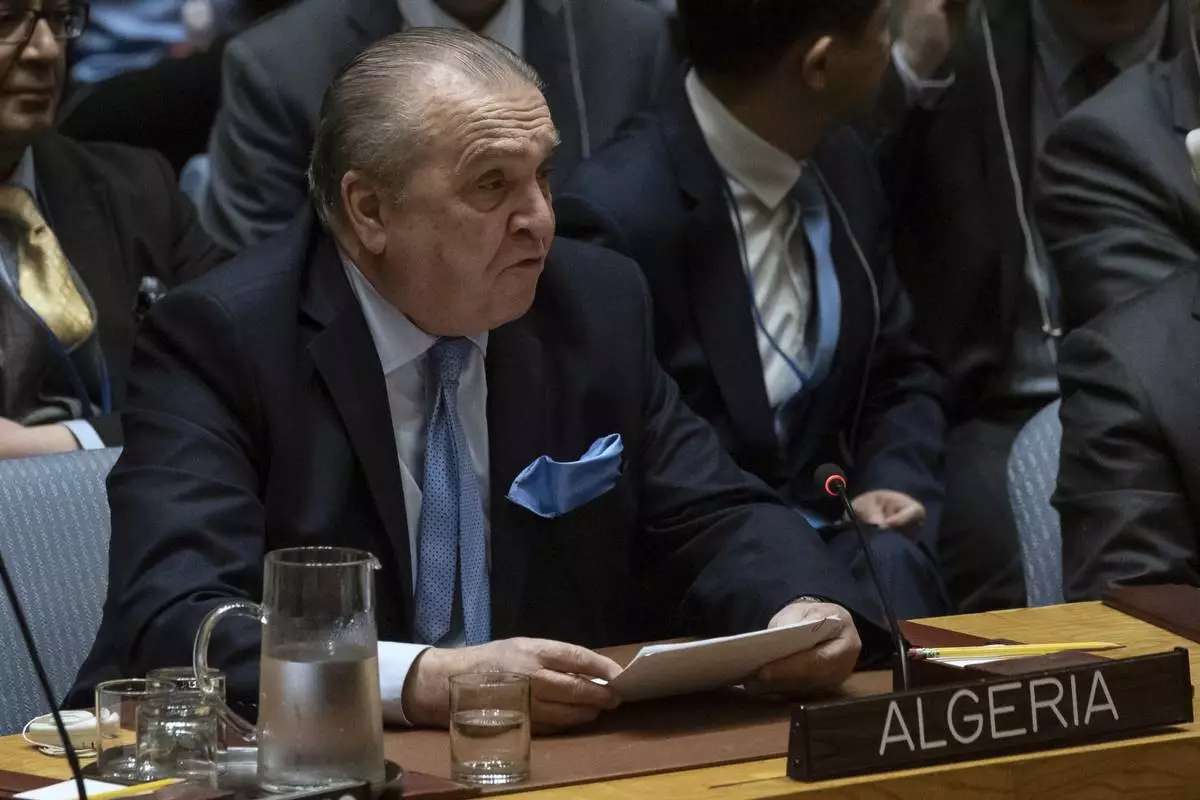
Algeria's Permanent Ambassador to the United Nations Amar Bendjama speaks during a Security Council meeting at United Nations headquarters, Thursday, April 18, 2024. (AP Photo/Yuki Iwamura)
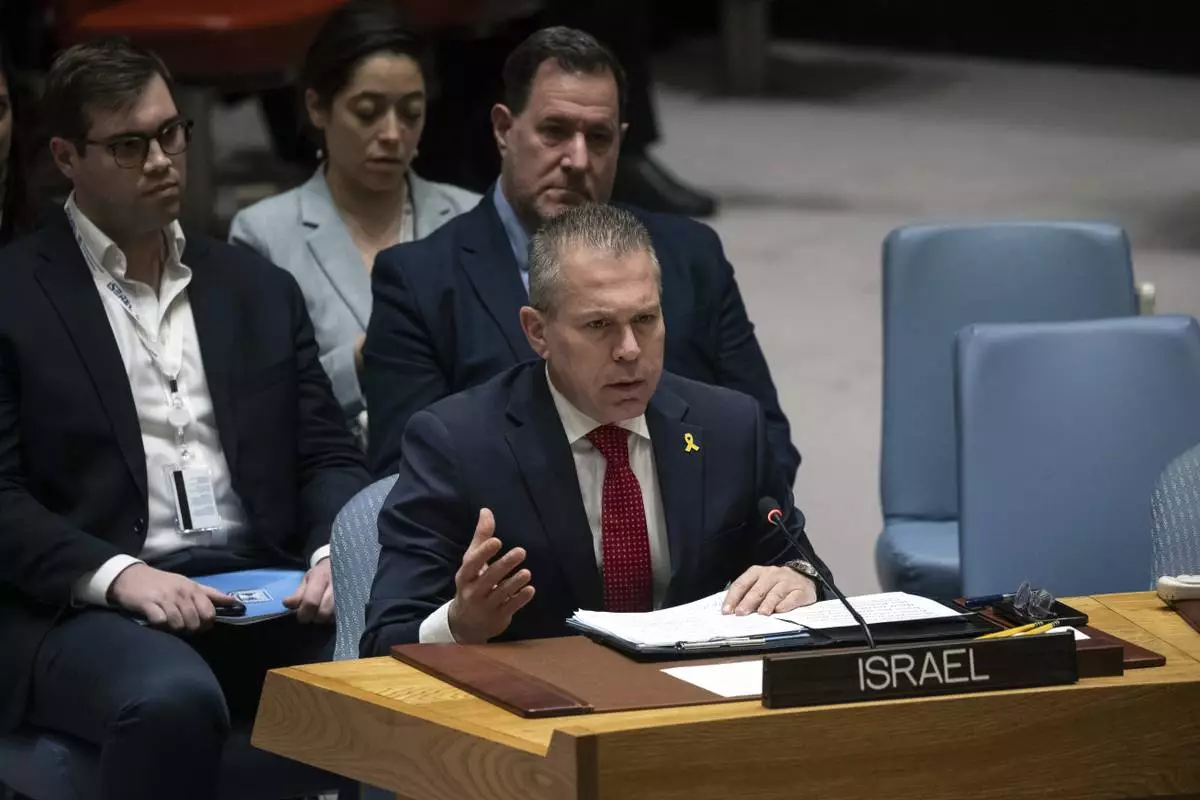
Israeli Ambassador to the United Nations Gilad Erdan speaks during a Security Council meeting at United Nations headquarters, Thursday, April 18, 2024. (AP Photo/Yuki Iwamura)
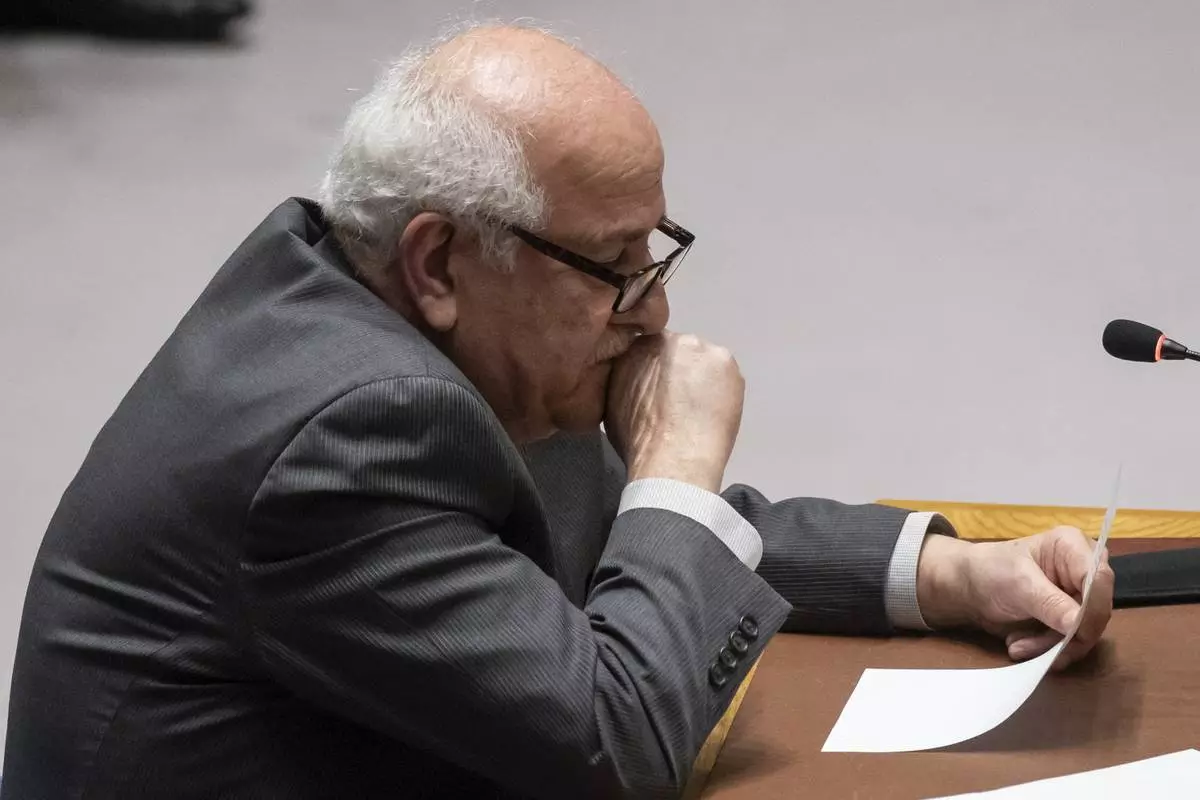
Palestinian Ambassador to the United Nations Riyad Mansour holds tears while speaking during a Security Council meeting at United Nations headquarters, Thursday, April 18, 2024. (AP Photo/Yuki Iwamura)
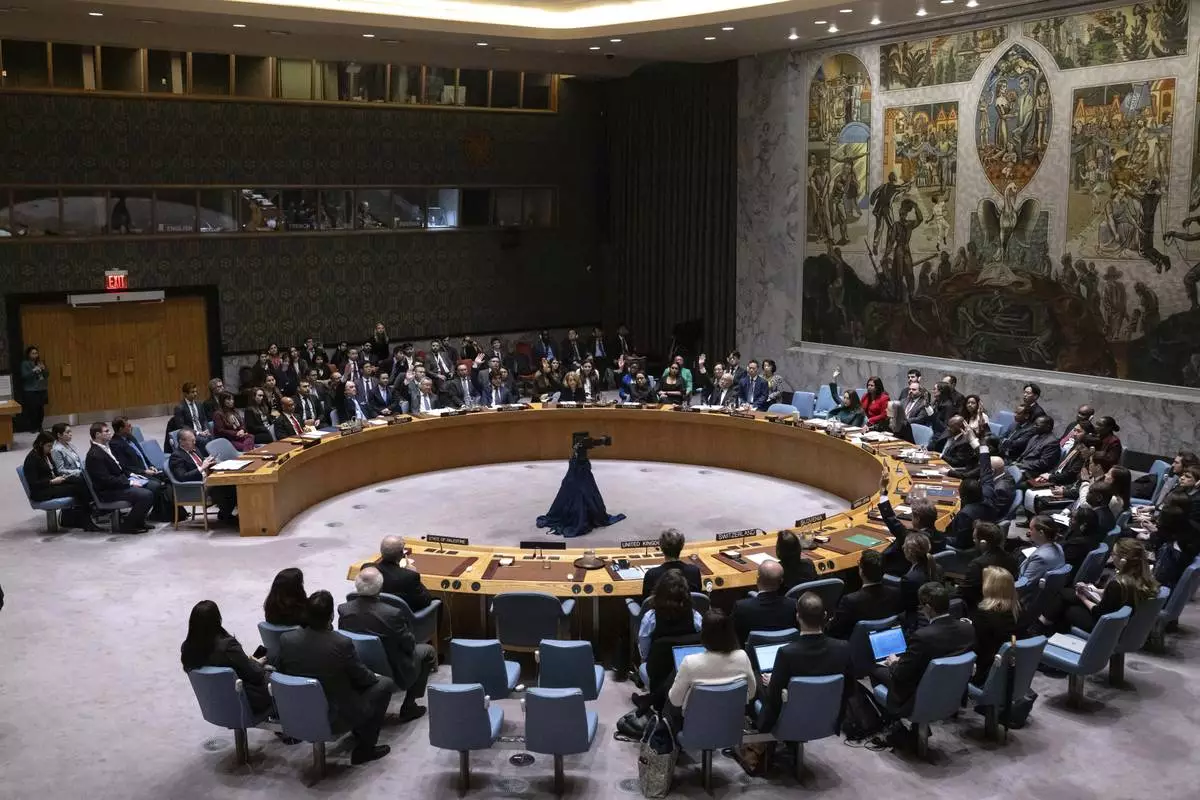
Representatives of member countries take votes during a Security Council meeting at United Nations headquarters, Thursday, April 18, 2024. (AP Photo/Yuki Iwamura)
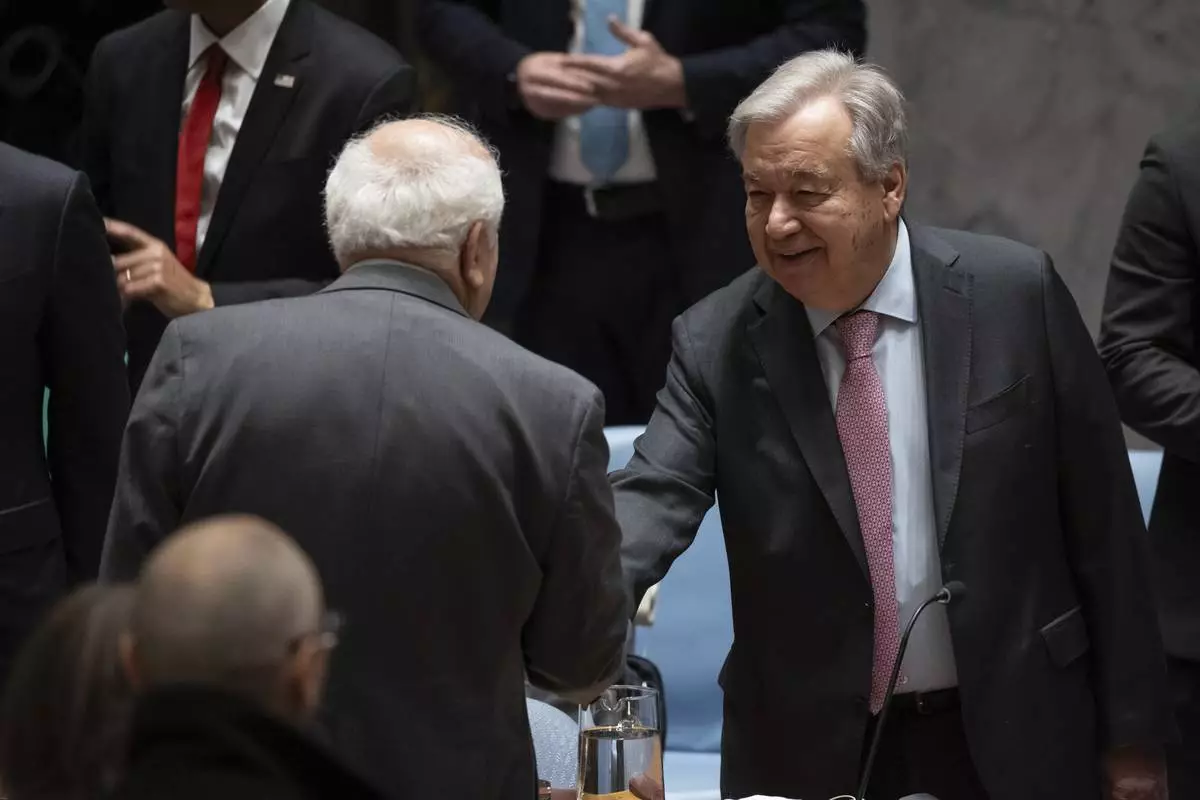
Palestinian Ambassador to the United Nations Riyad Mansour, left, and United Nations Secretary-General Antonio Guterres speak before a Security Council meeting at the United Nations headquarters, Thursday, April 18, 2024. (AP Photo/Yuki Iwamura)
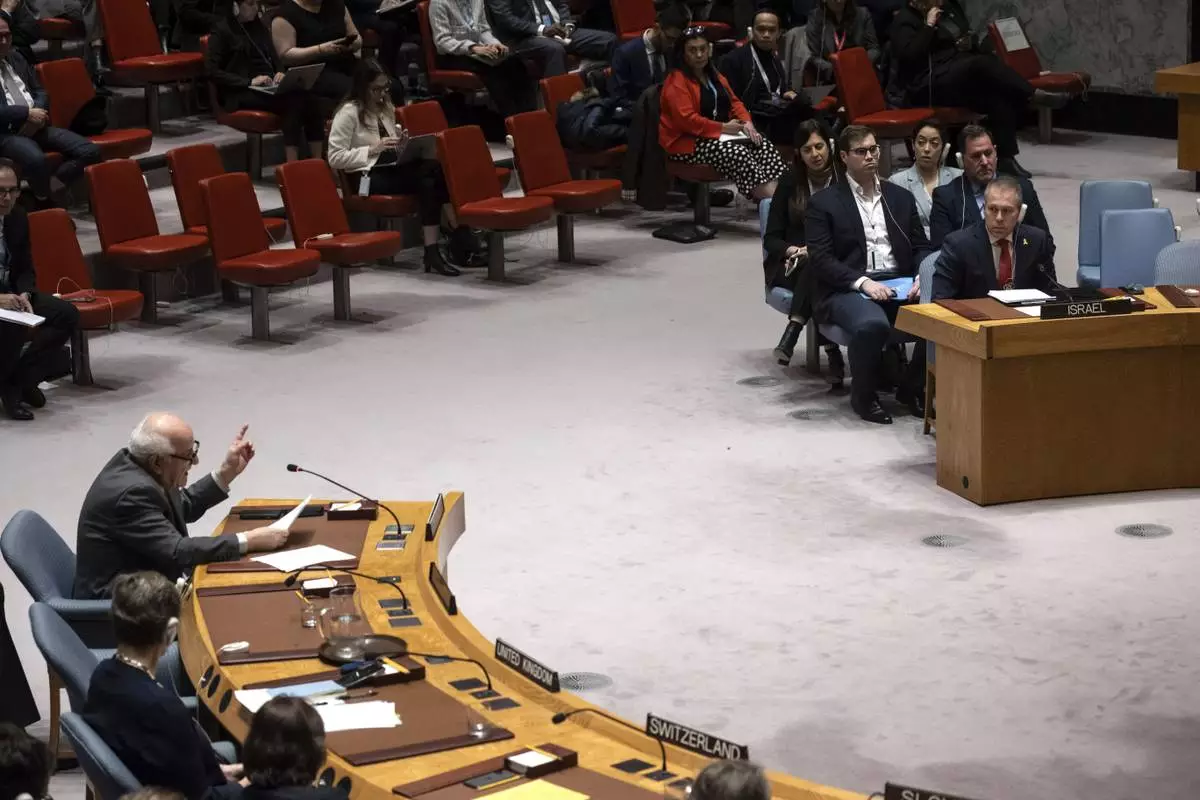
Palestinian Ambassador to the United Nations Riyad Mansour speaks during a Security Council meeting at United Nations headquarters, Thursday, April 18, 2024. (AP Photo/Yuki Iwamura)
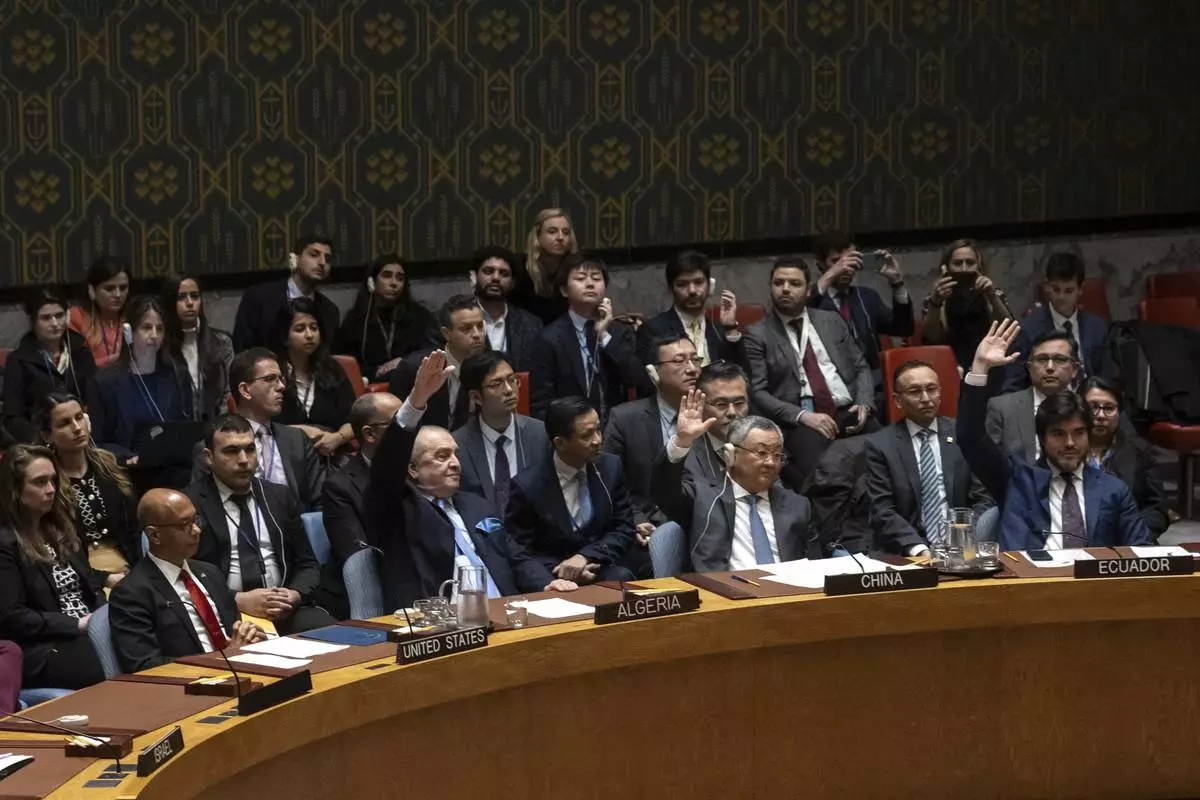
Representatives of member countries take votes during a Security Council meeting at United Nations headquarters, Thursday, April 18, 2024. (AP Photo/Yuki Iwamura)
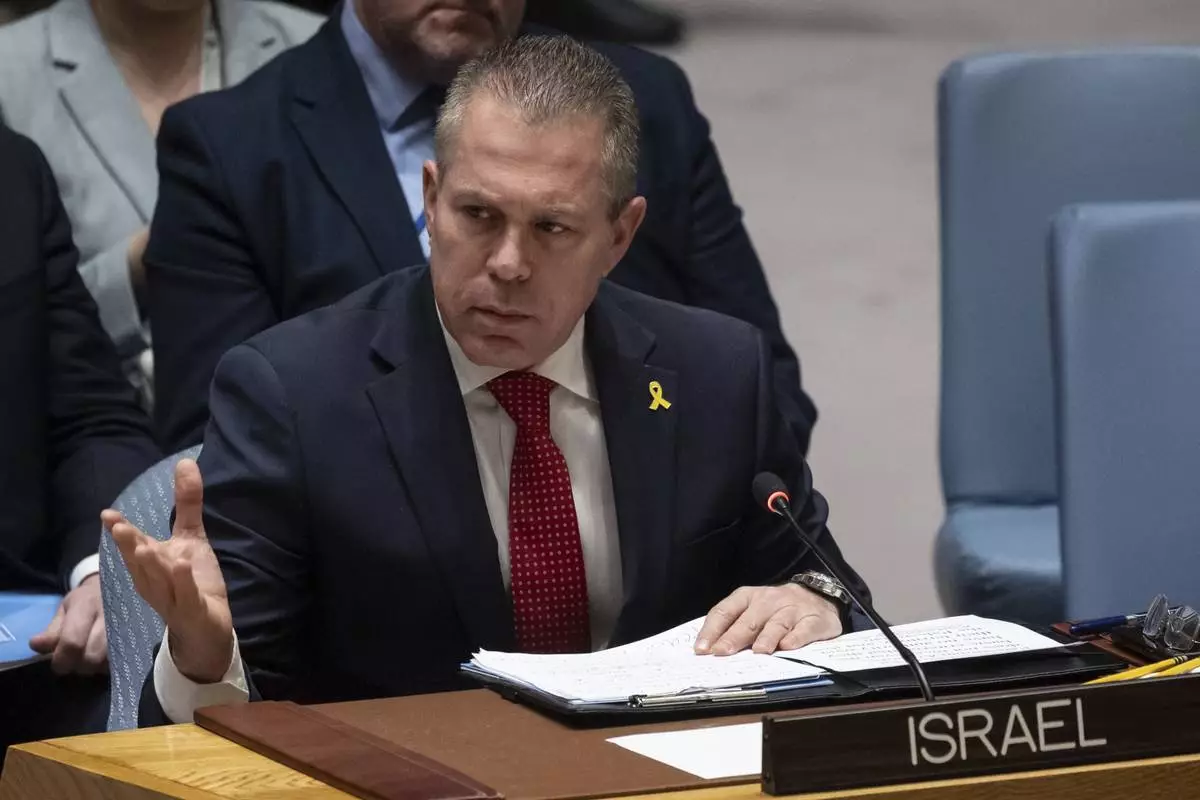
Israeli Ambassador to the United Nations Gilad Erdan speaks during a Security Council meeting at United Nations headquarters, Thursday, April 18, 2024. (AP Photo/Yuki Iwamura)
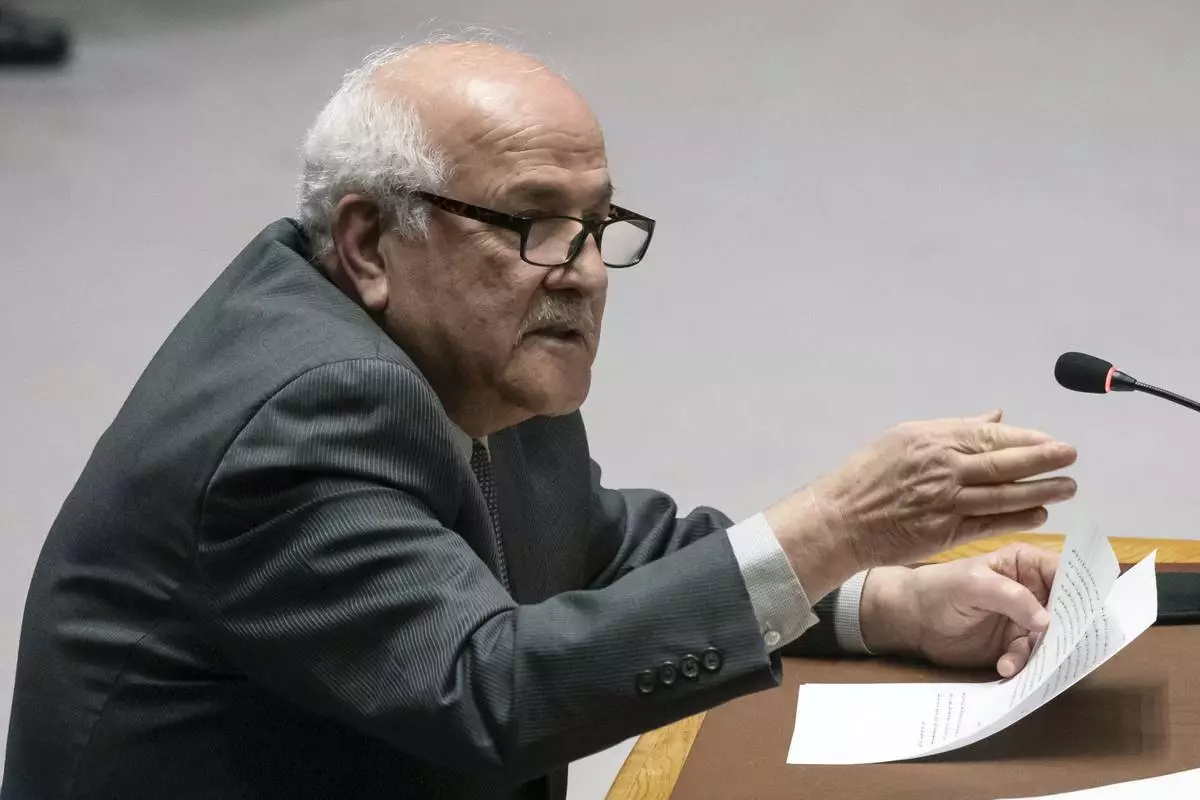
Palestinian Ambassador to the United Nations Riyad Mansour speaks during a Security Council meeting at United Nations headquarters, Thursday, April 18, 2024. (AP Photo/Yuki Iwamura)
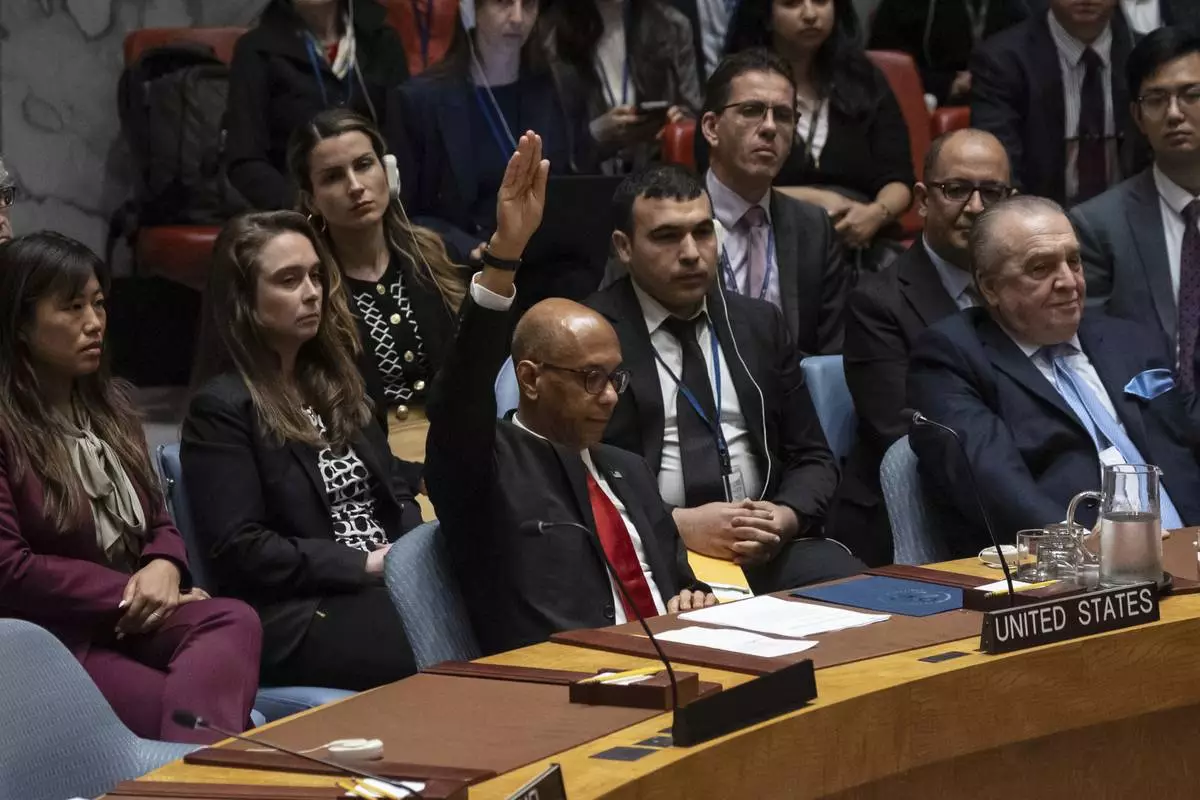
U.S. Deputy Ambassador Robert Wood votes against resolution during a Security Council meeting at United Nations headquarters, Thursday, April 18, 2024. (AP Photo/Yuki Iwamura)





















